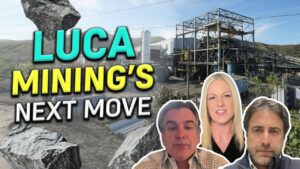VANCOUVER, BRITISH COLUMBIA, Feb 26, 2013 (MARKETWIRE via COMTEX) — Kimber Resources Inc. /quotes/zigman/8186 CA:KBR -7.41% (nyse mkt:KBX) today announced results from its underground rehabilitation and sampling program within the historic Carmen Level 1, underground workings of the Carmen deposit at the 100% owned Monterde gold-silver project in Chihuahua, Mexico. Level 1 is the middle and most extensive of three levels developed on the Carmen deposit. Assay results from Level 1 at Carmen show significant strike lengths of high grade gold and silver mineralization remaining on the vein structure that were not removed by mining in the 1930’s and 1940’s. The continuity of these high grade zones, over significant strike lengths, supports the potential for similar continuity of high grade zones intersected in other areas of the Carmen deposit.
Individual sample highlights from the sampling program are as follows:
———————————————————————–
—–
True
Sample Sample Width Gold Silver Gold Eq(i)
Number Location (m) g/t g/t g/t
—————————————————————————-
S090 Carmen 1 1.1 14.92 503.2 24.49
—————————————————————————-
S059 Carmen 1 2.1 9.11 268.1 14.20
—————————————————————————-
S022 Carmen 1 1.7 7.49 131.7 9.99
—————————————————————————-
S108 Carmen 1 2.5 5.12 246.5 9.81
—————————————————————————-
S045 Carmen 1 2.2 6.38 174.4 9.70
—————————————————————————-
(i) Gold equivalent based upon silver:gold ratio of $27/$1420, Gross metal
values, no recovery factor applied.
“We continue to be encouraged by the results of our underground sampling program in the Carmen deposit,” said Gordon Cummings, President and CEO of Kimber Resources. “The historic mining targeted areas of high grade gold and silver mineralization with good continuity. This underground sampling program returned grades as high as 7.87 g/t gold equivalent over 25 metres of strike length. These results, showing continuity of high grade gold and silver, further adds to our belief that the Carmen deposit offers excellent economic potential.”
The sampling results at Carmen, combined with drill results, have successfully provided valuable information, including:
1. Support of continuity of the zones of high grade mineralization within
the Carmen vein structure in the old mine workings.
2. Distribution of gold and silver within the mineralized zones on the
Carmen structure.
3. Mineralization controls, including lithological and structural.
4. Ground conditions for mine development planning and economics.
The following highlights some of the notable mineralization interpreted following compilation of the results from Carmen Level 1 (see figures 3-4 for further illustration):
———————————————————————–
—–
Samples Approx Average
Stations Strike sample
Included(ii) Length width Gold Silver Gold Eq.(i)
(m) (m) (g/t) (g/t) (g/t)
—————————————————————————-
S001-S014 40.0 2.0 0.82 65.2 2.06
—————————————————————————-
Including S001-S005 12.0 1.7 1.67 83.7 3.26
—————————————————————————-
S015-S021 17.0 2.7 1.85 107.5 3.90
—————————————————————————-
S017 N/A 26.0 0.28 61.9 1.46
—————————————————————————-
S022-S027 19.0 2.4 1.75 100.5 3.66
—————————————————————————-
S028-S048 60.0 2.4 0.90 105.3 2.90
—————————————————————————-
Including S035-S048 40.0 2.2 1.35 118.4 3.60
—————————————————————————-
S050-S057 26.0 2.4 2.02 127.2 4.44
—————————————————————————-
S059-S109 75.0 1.8 2.61 138.6 5.25
—————————————————————————-
Including S059-S090 25.0 1.7 4.53 175.9 7.87
—————————————————————————-
Including S090-S109 50.0 1.9 1.78 122.4 4.11
—————————————————————————-
S066-S085 58.0 1.7 0.27 37.2 0.98
—————————————————————————-
(i) Gold equivalent or Gold Eq g/t is based on a silver:gold ratio of
$27/$1420 with no adjustment for estimated metallurgical recoveries
(ii) Sample stations included in the selective strike length calculations
include only sample stations along the structure and thus may not include
all consecutive sample numbers. See Figures 3-4.
See Figures 1-4 for detailed images showing sample results. The sampled areas were between the mined out sections of the vein (stopes) from the historic work in the 1940’s which, in all probability, had better grades and/or thicknesses as they were mined out, whereas the material sampled by Kimber was left behind.
Description of style of mineralization and geology
In addition to confirming the favourable nature of the gold and silver mineralization along the Carmen vein structure, sampling of several cross cut drifts driven into the hanging wall and footwall of the principle vein correlate well with the modeling of the disseminated mineralization in the adjacent wall rock that surrounds the higher grade zones. Comparison of the cross cut samples with nearby reverse circulation and core drill holes provided further support of the geological model at Carmen. For example, sample results from the hanging wall mineralization exposed in the first cross cut drift over 26 metres of sample width averaged at 0.28 g/t gold, 61.9 g/t silver for 1.46 g/t gold eq. adjacent to the Carmen vein.
Of special interest was the observation that the more permeable TBX and FTU lithological units allowed dissemination of the mineralizing fluids into the rock adjacent to the Carmen and Hilos vein structures. The more massive and brittle PQ unit was favorable for formation of vein stockworks and breccias. The TBX unit is a volcaniclastic unit consisting of mudflow (lahar) deposits deposited in paleo-river channels eroded in the underlying volcanic tuff deposits. Rounded boulders and cobbles of altered volcanics are surrounded by volcanic ash and sandstone that are permeable to the hydrothermal fluids, allowing the mineralization to spread laterally out from the vein structures. Similarly, the FTU unit, a weakly to moderately consolidated volcanic breccia deposit found beneath the TBX, has good permeability allowing for the mineralization to disseminate into the surrounding country rock. The PQ unit is interbedded with the TBX and FTU units, and consists of thick, massive lava flows of rhyolite to rhyodacite quartz porphyry that is a dense and brittle host rock. This unit hosts stockwork and breccia hosted mineralization adjacent to the veins, especially where secondary hanging wall veins such as the Carmen splays (see samples S049 and S058) and Hilos 1 and 2 vein intersections.
Description of the current work program and history of the underground mining
The underground work program initiated at the Carmen deposit was aimed at providing more than 650 metres of underground access to high-grade gold-silver mineralized structures, including the Carmen and Hilos structures (see figures 2 and 3 below). Thus far access has been achieved within all four of the targeted adits and total access exceeds 965 metres within the historic underground mine workings. Levels rehabilitated currently include Hilos Mine levels 0 and 1 (results released on December 20, 2012) and Carmen Mine levels 1 and 3. Assay results have been received for sampling on the Hilos levels 0 & 1 and Carmen 1 level. Rehabilitation and sampling continues on the Carmen Level 3 workings.
Figures 1 & 2 show the spatial relationship of the historic workings with relation to the proposed Open Pit as outlined in the 2011 Preliminary Economic Assessment (the “PEA”). While the levels being sampled are within the proposed Open Pit, the sampling and mapping will provide important insight in respect of the continuity of the same vein structures below the proposed pit bottom. This information will be incorporated into the ongoing economic and engineering studies of the Carmen deposit development alternatives.
Figures 3 & 4 show the sample station locations within Carmen level 1. See the company website at www.kimberresources.com for a full table of the sample data.
Historic production of gold and silver ores from the Monterde underground mine took place between 1937 and 1944. Total production has been estimated at 68,000 tonnes grading 19.29 g/t gold and 311.5 g/t silver. The mining cut-off grade is reported to have been approximately 15.0 g/t gold. All of the material produced was oxide in nature. Historic mining depths were greater than 250 metres vertical. Production was from two underground mines located on two separate shears, Carmen and Los Hilos, separated by an east-west distance of approximately 150 metres.
Sampling Program Description and QA/QC
Sampling within the underground workings included diamond saw channel sampling, taken in compliance with the Company’s core drilling QA/QC protocol, and have been analyzed for gold, silver and trace elements with ALS Chemex laboratory. The vein exposures in the back (roof) and face of the workings are sampled in stations perpendicular to the strike of the structure, with the widths of the individual samples determined by the mineralization and alteration. Sample stations include one to four continuous channel samples, with the hanging wall, vein and footwall mineralization separated into individual samples. Sample stations are spaced at approximately 2 metre intervals along the vein except in areas where historic mining has removed the vein. Minimum sample width was 0.4 metres and maximum was 2.0 metres. The cross cut drifts were sampled along waist high horizontal channel samples, with sample widths again determined by mineralization, but typically on 1.5 metre intervals. The data is being compared to the drill data in the area of the sampling for validation crosschecks and to analyze trends where stronger gold-silver mineralization occurs. Sample widths reported are true thicknesses except for horizontal crosscut samples which are approximately 80-100% of true thickness. Duplicate channel samples were taken for each 20th sample with blank and standard samples inserted in the sample stream.
About Kimber
Kimber owns mineral concessions covering in excess of 39,000 hectares in the prospective Sierra Madre gold-silver belt, including the Monterde property, where three gold-silver mineral resources have already been defined. The most advanced of these, the Carmen deposit, has been extensively drilled and has undergone detailed geologic modeling. The completion of the Updated Preliminary Economic Assessment for Monterde in 2011 represented a significant step forward for Kimber and supported further evaluation and more advanced economic studies at the Monterde deposits, with the recently filed 2012 Updated Mineral Resource Estimate Technical Report for the Carmen deposit representing a component of those activities.
Forward-looking statements
Statements in this release may be viewed as forward-looking statements, including statements regarding estimates of mineral resources at Monterde, the preliminary economic assessment of the Monterde project, the conversion of inferred mineral resources to measured and indicated mineral resources, the conversion of mineral resources to mineral reserves, life of mine estimates, the potential for gold and silver mineral resources in the Carmen and Veta Minitas deposits and other targets within the Monterde project, the implications of the results of drill holes reported herein, the results of future exploration, the economic potential of any such discoveries made, the further development, expected results and future economic assessments of the Monterde project. When used in this press release, the words “expect”, “intend”, “hopes”, “should”, “believe”, “may”, “will”, “if”, “conviction”, “anticipates”, “potential for”, “potentially”, “suggests” and similar expressions are intended to identify forward-looking statements. Such statements involve risks and uncertainties that could cause actual results to differ materially from those projected. Such risks and uncertainties include, among others, uncertainty of mineral reserve and resource estimates, continuity of mineralization between drill holes, risks relating to fluctuations in the price of gold, the inherently hazardous nature of mining-related activities, potential effects on Kimber’s operations of environmental regulations in the countries in which it operates, risks due to legal proceedings, risks relating to political and economic instability in certain countries in which it operates, risks related to the use of inferred mineral resources in the preliminary economic assessment, and uncertainty of being able to raise capital on favourable terms or at all, as well as those risk factors discussed under the headings “Cautionary Note Regarding Forward-Looking Statements” and “Risk Factors” in Kimber’s latest Annual Report on Form 20-F as recently filed on SEDAR and EDGAR.There are no assurances the Company can fulfil such forward-looking statements and the Company undertakes no obligation to update such statements, except as required by law. Such forward-looking statements are only predictions; actual events or results may differ materially as a result of risks facing the Company, some of which are beyond the Company’s control.
Quality Assurance/Quality Control
The technical information in this news release has been prepared in accordance with Canadian regulatory requirements set out in National Instrument 43-101 and reviewed and approved by Mr. David R Hembree, Vice President Exploration of the Company. The exploration activities at the Monterde project site are now carried out under the supervision of Mr. David R Hembree, who is the designated Qualified Person under National Instrument 43-101 for the Monterde project and is responsible for quality control at Monterde and has verified the data being disclosed herein. He has determined that the laboratory reports matched the underground sample logs and that the quality control assays fall within reasonable limits. QA/QC procedures incorporate blanks and duplicates inserted at the mine and standards inserted after sample preparation. Sample preparation was done by ALS Chemex at its Chihuahua laboratory. Pulps are analyzed by ALS Chemex at its laboratory in North Vancouver, British Columbia, using 50 gram sub-samples, using fire assay with an AA finish for gold and four-acid digestion and ICP finish for silver from a 0.4 gram subsample. Over limit gold or silver intervals are re-assayed by fire assay with gravimetric finish.
Cautionary Note to U.S. Investors – The United States Securities and Exchange Commission permits U.S. mining companies, in their filings with the SEC, to disclose only those mineral deposits that a company can economically and legally extract or produce. Kimber Resources uses certain terms in this news release and on its website, such as “measured,” “indicated,” and “inferred,” “mineral resources,” which the SEC guidelines strictly prohibit U.S. companies from including in their filings with the SEC.U.S. Investors are urged to consider closely the disclosure under the heading “Cautionary Note to U.S. Investors Regarding Mineral Reserve and Resource Estimates” in our latest annual report on Form 20-F which may be secured from us, or from the SEC’s website at http://www.sec.gov/edgar.shtml.
To view Figures 1 to 4, click on the following link: http://media3.marketwire.com/docs/k225p.pdf
Contacts:
Kimber Resources Inc.
Renee Brickner, BSc (Hons) Geol.
Vice President, Investor Relations
North America Toll Free: 1-866-824-1100 or (604) 669-2251Kimber Resources Inc.
Gordon Cummings, CA
President and CEO
North America Toll Free: 1-866-824-1100 or (604) 669-2251
(604) 669-8577 (FAX)
kimbernews@kimberresources.com
www.kimberresources.com
SOURCE: Kimber Resources Inc.
















